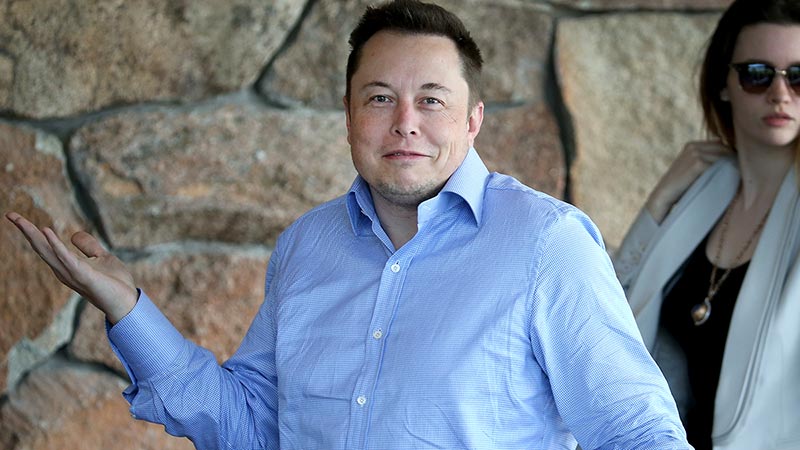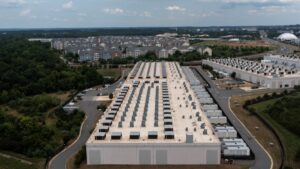Elon Musk wants to take Tesla private, but says no final decision has been made

Telsa boss Elon Musk with ex-wife and Westworld star Talulah Riley. Pic: Getty
Tesla CEO Elon Musk Tweeted overnight that he was considering taking the company private at $US420 per share.
“Am considering taking Tesla private at $US420. Funding secured,” Mr Musk said.
A shareholder vote must be held before a final decision is made, he said.
The electric car maker is closely watched by investors who hold battery metal stocks producing materials such as lithium and cobalt.
“Investor support is confirmed. Only reason why this is not certain is that it’s contingent on a shareholder vote,” he said.
In an email to employees, Mr Musk said taking the company private was “the best path forward.” The pressures of being a public company created distractions and promoted short-term thinking that might not produce the best decisions in the long-term.
“I fundamentally believe that we are at our best when everyone is focused on executing, when we can remain focused on our long-term mission, and when there are not perverse incentives for people to try to harm what we’re all trying to achieve,” he said.
Musk to remain CEO
Mr Musk also said via Twitter that he wouldn’t expect to have a controlling vote if the company went private and wouldn’t sell Tesla stock. He added that he would remain CEO of the company.
“I don’t have a controlling vote now and wouldn’t expect any shareholder to have one if we go private. I won’t be selling in either scenario,” he said.
Musk also said on Tuesday via Twitter that he will create a “special purpose fund” if the company goes private so current Tesla shareholders can keep their investments in the company. He added that new investors would have the opportunity to purchase stock around once every six months.
“My hope is *all* current investors remain with Tesla even if we’re private. Would create special purpose fund enabling anyone to stay with Tesla. Already do this with Fidelity’s SpaceX investment,” he said.
Musk also said that he was appreciative of the company’s shareholders and “will ensure their prosperity in any scenario”.
Tesla has been public since 2010. The company had a market capitalisation of more than $US60 billion, as of Tuesday afternoon. Its share price reached as high as $US371.15 per share after Musk’s tweet. It was trading around $US361 in early afternoon trading.
Musk has said he would like to take Tesla private in the past.
“I wish we could be private with Tesla,” Musk said in an interview with Rolling Stone published in November 2017. “It actually makes us less efficient to be a public company.”
Musk has also said on multiple occasions that Tesla will become profitable by the end of this year and won’t need to raise additional funds, despite its increased cash burn rate in recent quarters.
- Subscribe to our daily newsletter
- Bookmark this link for small cap news
- Join our small cap Facebook group
- Follow us on Facebook or Twitter
At the end of June, Tesla achieved its goal of making 5000 Model 3 sedans in one week. Musk previously said the company would hit that number by the end of 2017, and that sustaining such a production rate is critical for Tesla to become profitable.
The Financial Times reported on Tuesday that Saudi Arabia’s sovereign wealth fund has acquired a $US2 billion stake in the company. The fund owns between 3% and 5% of Tesla’s total stock, which means the stake is likely worth between $US1.7 billion and $US2.9 billion.
Tesla reported an adjusted loss per share of $US3.06 for the second quarter, which was larger than what analysts had predicted, and revenue of $US4 billion, which beat analyst projections, in an earnings letter released last week. The company said it expects to be profitable during the second half of 2018.
“Going forward, we believe Tesla can achieve sustained quarterly profits, absent a severe force majeure or economic downturn, while continuing to grow at a rapid pace,” the company said in its earnings report.
You can read the full email Musk sent to Tesla employees on Tuesday below:
Earlier today, I announced that I’m considering taking Tesla private at a price of $US420/share. I wanted to let you know my rationale for this, and why I think this is the best path forward.
First, a final decision has not yet been made, but the reason for doing this is all about creating the environment for Tesla to operate best. As a public company, we are subject to wild swings in our stock price that can be a major distraction for everyone working at Tesla, all of whom are shareholders. Being public also subjects us to the quarterly earnings cycle that puts enormous pressure on Tesla to make decisions that may be right for a given quarter, but not necessarily right for the long-term. Finally, as the most shorted stock in the history of the stock market, being public means that there are large numbers of people who have the incentive to attack the company.
I fundamentally believe that we are at our best when everyone is focused on executing, when we can remain focused on our long-term mission, and when there are not perverse incentives for people to try to harm what we’re all trying to achieve.
This is especially true for a company like Tesla that has a long-term, forward-looking mission. SpaceX is a perfect example: it is far more operationally efficient, and that is largely due to the fact that it is privately held. This is not to say that it will make sense for Tesla to be private over the long-term. In the future, once Tesla enters a phase of slower, more predictable growth, it will likely make sense to return to the public markets.
Here’s what I envision being private would mean for all shareholders, including all of our employees.
First, I would like to structure this so that all shareholders have a choice. Either they can stay investors in a private Tesla or they can be bought out at $US420 per share, which is a 20% premium over the stock price following our Q2 earnings call (which had already increased by 16%). My hope is for all shareholders to remain, but if they prefer to be bought out, then this would enable that to happen at a nice premium.
Second, my intention is for all Tesla employees to remain shareholders of the company, just as is the case at SpaceX. If we were to go private, employees would still be able to periodically sell their shares and exercise their options. This would enable you to still share in the growing value of the company that you have all worked so hard to build over time.
Third, the intention is not to merge SpaceX and Tesla. They would continue to have separate ownership and governance structures. However, the structure envisioned for Tesla is similar in many ways to the SpaceX structure: external shareholders and employee shareholders have an opportunity to sell or buy approximately every six months.
Finally, this has nothing to do with accumulating control for myself. I own about 20% of the company now, and I don’t envision that being substantially different after any deal is completed.
Basically, I’m trying to accomplish an outcome where Tesla can operate at its best, free from as much distraction and short-term thinking as possible, and where there is as little change for all of our investors, including all of our employees, as possible.
This proposal to go private would ultimately be finalised through a vote of our shareholders. If the process ends the way I expect it will, a private Tesla would ultimately be an enormous opportunity for all of us. Either way, the future is very bright and we’ll keep fighting to achieve our mission.
Thanks, Elon
This article first appeared on Business Insider Australia, Australia’s most popular business news website. Read the original article. Follow Business Insider on Facebook or Twitter.
UNLOCK INSIGHTS
Discover the untold stories of emerging ASX stocks.
Daily news and expert analysis, it's free to subscribe.
By proceeding, you confirm you understand that we handle personal information in accordance with our Privacy Policy.








